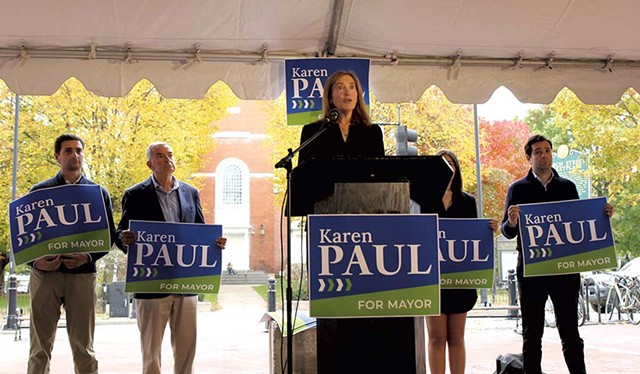
- File: Courtney Lamdin
- City Council President Karen Paul
The vibes were decidedly different at the campaign kickoffs of the three women vying for the Democratic nomination to become Burlington's next mayor.
City Council President Karen Paul's (D-Ward 6) polished and professional event in late October led with speeches from party bigwigs: former governor Howard Dean and Vermont Senate President Pro Tempore Phil Baruth (D/P-Chittenden-Central). A week later, Councilor Joan Shannon (D-South District) held a veritable pep rally on the back steps of city hall, where her cheerleaders shouted out her campaign slogan, "All hands on deck!" C D Mattison's mid-November launch was more laid-back. After her speech, she exchanged hugs and high-fives as DJ Craig Mitchell spun the Bill Withers tune "Lovely Day."
Pomp and circumstance aside, all three candidates framed the race around the same issue: public safety. On the campaign trail and in interviews with Seven Days, each candidate pitched herself as best able to address rising homelessness, crime and public drug use in Burlington.
"Our city is in crisis," Mattison said. Burlington has "enormous challenges" with crime, Shannon said. Many residents "don't feel that sense of safety," Paul said.
Each woman is hoping to succeed Mayor Miro Weinberger, a four-term Democrat who is calling it quits after 12 years in office. (Weinberger won't say whom he's supporting in the race.)
Democrats will meet on December 10 to choose their nominee for the March 5 Town Meeting Day ballot. So far, only one Progressive — Vermont Rep. Emma Mulvaney-Stanak (P/D-Burlington) — is running, though more candidates could emerge before that party's December 4 caucus. Republicans hope to nominate someone on December 19, while independent candidates have until January 29 to get on the ballot.
Paul and Shannon said they will drop out of the race if they don't receive the party's nomination. Mattison wouldn't commit either way, saying she's "focused on the caucus."
Shannon and Paul have long records as elected public officials that provide a picture of their respective styles and insight into how they'd approach some issues. Shannon joined the council in 2003. Paul was elected in 2008 as an independent, then won as a Democrat in 2014.
Paul represents the city's Hill Section and the east side of the South End. Shannon's South District seat includes both the Hill Section and the west side of the South End. The two had never gone head-to-head until a 2013 contest for council president. That vote ended in a deadlock, until Paul bowed out of the race and then-councilor Jane Knodell switched her vote to Shannon. Knodell, a Progressive who lost her Central District seat in 2019, is now advising Shannon's campaign.
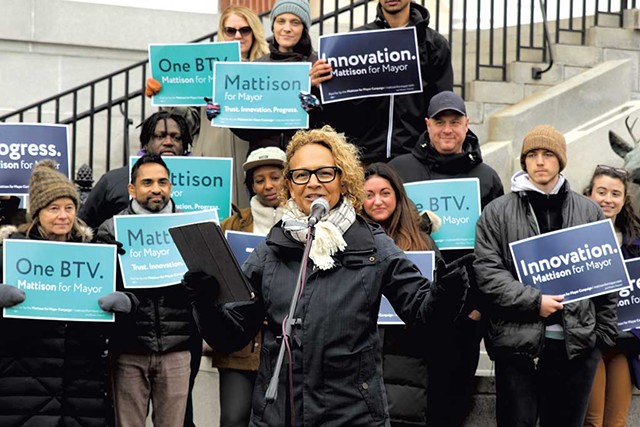
- File: Courtney Lamdin
- C D Mattison
Mattison, 58, has positioned herself as the antiestablishment candidate, up against two party heavyweights. A Black biracial gay woman, Mattison has said she wants to appeal to people who feel unheard by city government. "This is our Burlington," she writes on her website. "Let's build it together."
She is a tech consultant who also lives in the city's South End. On one of her recent daily walks downtown, she posted a selfie-style Instagram video to encourage people to shop and dine there — a response to recent commercial vacancies that some have attributed to rising crime. Mattison's approach appeals to Cara Chigazola Tobin, chef and co-owner of Honey Road restaurant at Church and Main streets. "She's so connected to the community and really hears the concerns that people are expressing," Tobin said.
Paul, 63, has embarked on her own listening tour by hitting the phones, knocking on doors and meeting with small groups of residents at her supporters' homes. A certified public accountant, Paul has been talking up her financial know-how, including her 11-year stint on the council's powerful Board of Finance.
Paul, who lives in the Hill Section, has support from at least one of her colleagues: Councilor Sarah Carpenter (D-Ward 4), who, like Paul, grew up in the Queen City. Carpenter said Paul can work with people of all political persuasions. "We need her in the mayor's office to help that happen," Carpenter said.
Other council Dems haven't publicly endorsed a candidate, but Councilor Mark Barlow (I-North District) is with Shannon. He recently helped organize a meet and greet in the New North End, just one of Shannon's public appearances in recent weeks. She also hosted a sold-out fundraiser at the St. John's Club in her South End neighborhood and last week led a mini parade of supporters to the city's annual tree lighting on the Church Street Marketplace.
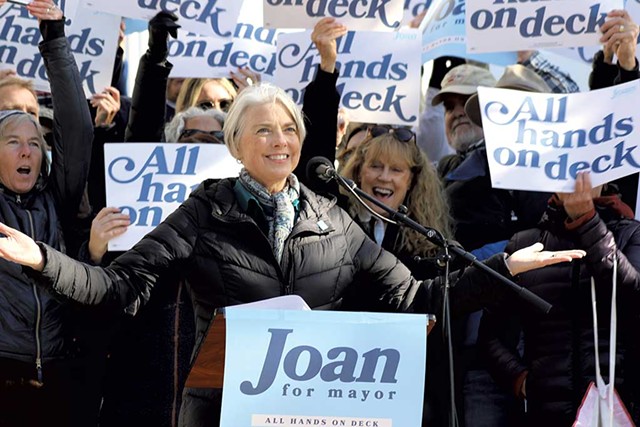
- File: Courtney Lamdin
- City Councilor Joan Shannon
Shannon, 59, a real estate agent, says she's raised $54,000 from 300 donors since her kickoff on November 2. (Paul wouldn't say how much she's raised; Mattison says she's raised nearly $6,700.)
Shannon supporters say they appreciate that she speaks her mind, even on politically fraught topics. In 2021, her opposition to a proposed police oversight board spurred a flurry of prank phone calls that interrupted a council debate. She reported the pranksters to the police, earning her a scathing mention in the leftist online publication the Rake Vermont, which said Shannon used "countless hours of government resources ... to punish and silence these activists."
That same year, Shannon's vocal support for closing a sprawling homeless encampment on Sears Lane inspired her critics to wear T-shirts emblazoned with "Fxck Jxxn Shxnnxn" to city council meetings. That sentiment is a lasting one: A passerby lobbed the curse at the councilor during her campaign launch on the back steps of city hall last month.
Shannon sees her outspokenness as a strength that distinguishes her from Paul.
"You often don't know where she is [on an issue] until she votes," Shannon said of her colleague. "I'm much more likely to communicate that in advance, give people an opportunity to persuade me that I'm wrong — or to know that they don't have to waste their time with me."
Paul, for her part, chalked this up to a difference in style, not substance.
"I bring an ability to really listen intently and authentically," she said. "Not to say, 'This is my position' and then ask people how they feel, but to ... form my opinions based on what I hear."
In the end, Shannon and Paul have nearly identical voting records, but one difference could divide some Democrats. In June 2020, Shannon voted against a successful Progressive-led resolution to slash police staffing through attrition. Paul voted in favor. More than a dozen officers subsequently left the department, and many residents have connected the exodus to an increase in crime.
The Burlington Police Officers' Association has also repeatedly slammed the council vote. This week, the union endorsed Shannon, saying her vote shows she is "the only mayoral candidate to unwaveringly support the Burlington Police Department and its officers."
Shannon's stance has resonated with some voters, too. Hill Section resident Walter Judge, an attorney who attended Shannon's St. John's Club fundraiser, said he's voting for Shannon because she refused to bow to political pressure in 2020, when anti-police sentiment was high following the murder of George Floyd in Minneapolis.
"She just said no," Judge said. "That's it for me."
Paul says her position was more nuanced. She notes that at the same meeting, she voted against a second resolution that she described as taking a more draconian approach to reducing the police force.
More importantly, Paul said, she's led efforts to rebuild the ranks. In 2021, she said she convinced two council Progs to break with their party and vote to raise the roster cap to 87 officers, an effort that had failed twice before. Paul also takes credit for whipping a near-unanimous vote to approve a new police union contract, which gave members a 20 percent base pay increase over three years, in July 2022.
"That was something I did," Paul said. "Anybody could have done it, but only one person did."
Commercial real estate magnate Ernie Pomerleau said he's supporting Paul despite believing the police cut was the "worst single decision" ever made in Burlington. Paul erred in voting for the resolution, Pomerleau said, but she backs the department "100 percent." He recently donated $50,000 to the city after Paul proposed matching it with the same amount in local coronavirus recovery funds to improve safety downtown during the holidays. City officials haven't decided how the money will be spent but have suggested it could go toward hiring private security to protect businesses.
"[Karen] is now fully engaged and fully prepared to put public safety as her No. 1, 2 and 3 priority," Pomerleau said. "I've seen her plan. I think she knows this is a crisis."
Burlington has indeed been struggling. Since the pandemic, the city has seen an influx of dangerous drugs, including fentanyl, methamphetamine and xylazine, an animal tranquilizer that causes recalcitrant wounds. Discarded needles litter public spaces, and overdoses are at an all-time high. Many more people are sleeping on the streets.
All of these factors have combined to create a sense of unease in the city — and urgency. Last month, city councilors passed a resolution declaring the drug crisis to be Burlington's top public health and safety issue. In recent weeks, more than 1,000 people have signed a petition calling on elected officials "to urgently take new and expanded actions to turn the tide of this crisis." The letter is being circulated by residents Andy Vota and Knodell, the former councilor and Shannon's campaign treasurer. Knodell said the effort predated the mayoral race and isn't affiliated with Shannon's campaign. All three candidates have signed the petition.
The candidates also share similar views on how to address the problem. They all believe Burlington would be safer with more police and better-funded social services, such as street outreach teams. They all want to create more shelter beds and build more housing to get people off the streets. They all think the state needs to invest in a better long-term mental health care system.
But their platforms also differ, or at least give priority to different strategies. Paul's six-page "action plan" calls for upgrading the police station and says that offering retention bonuses to police officers would be one of her "top budget priorities" next year. She also wants to revamp the city's trespass ordinance to make it easier for businesses to deal with shoplifters — though she declined to explain how that would be accomplished because the proposal is still being vetted by city attorneys.
Shannon's plan also focuses on theft, including a promise to advocate for stronger laws to more effectively hold perpetrators accountable — though, like Paul, she does not give specifics. She wants to work with citizen groups that recover stolen property, such as the BTV Stolen Bike Report and Recovery Facebook group, which boasts nearly 4,000 members, dozens of success stories and a feature last year in the New York Times. Partnering with the groups, the plan says, would "enhance the effectiveness, safety, and professionalism of their efforts." Shannon's plan also mentions building "supervised housing" for people in recovery.
Mattison, meantime, has suggested deploying mobile methadone clinics to lower barriers to addiction treatment and offering job training programs to people exiting homelessness. She also proposed reopening the Mayor's Youth Office, a Bernie Sanders-era creation that spawned the now-shuttered 242 Main teen space, to engage kids who may otherwise get into trouble. And she said Burlington hotels should charge a "tourist tax," which would feed into a public safety fund. Mattison said she didn't support the police cuts in June 2020.
"I think we can all agree that what we've been doing for the last 10, 15 years hasn't been working," Mattison said. "We're stuck, and we need to change."
Ward 3 resident Maia Gawor-Sloane is confident Mattison can deliver that change. Gawor-Sloane, who was part of the cut-the-police movement, said she appreciates that Mattison's plan focuses on helping people who are struggling instead of supporting the police. Giving cops bonuses and renovating their headquarters won't address public safety challenges, Gawor-Sloane said.
"The solution is more nuanced," she said. Mattison "wants to listen to everyone and find a way to put everything on the table."
The candidates have plenty of longer-term initiatives, but they also realize their constituents want immediate action, particularly on the drug crisis. Burlington leaders have generally favored harm reduction, believing that substance-use disorder is an illness that can't be treated with incarceration. As drug use becomes more visible, though, some have suggested the city's stance is too permissive.
Shannon worries that public drug use is becoming the norm. She thinks the city should intervene — first with social workers, then with police if the behavior continues.
"The expectation if someone is arrested is not that they go to prison, but rather they are offered treatment," she said. "At a minimum, their day is interrupted so they can't keep doing what they were doing."
Mattison has a different plan. She says arresting people won't help and suggested that simply deploying more cops downtown could deter people from using in public. She also said the city needs to consider the root causes.
"It takes a lot for someone to end up in that place," she said. "Public safety isn't just about law enforcement. It's a community responsibility."
Paul agrees that the city can't arrest its way out of the problem, but she also didn't offer another approach to it. She said the city plans to hold two forums about the drug crisis next month, which will inform her opinion on the matter.
With less than two weeks before the vote, each of the candidates is making a big push to boost turnout of her supporters at the caucus, which will be conducted using a regular ballot; to win, a candidate has to get 50 percent plus one vote. As of Tuesday, more than 800 people had registered for the event. Party chair Adam Roof said he expects this year's attendance to exceed the 1,300 people who participated in the last contested Democratic caucus, ahead of the 2012 election.
Councilor Hannah King (D-Ward 8), the party vice chair, hasn't backed a candidate, citing party bylaws that prohibit her from publicly endorsing one before the caucus. But King said she's excited by the contenders, all of whom supported her campaign last March.
"We're very, very lucky to have three incredible candidates," she said. "I think Dems are incredibly strong."
Correction, December 6: A previous version of this story misstated the percentage of votes a candidate needs to win the election.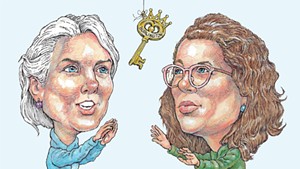
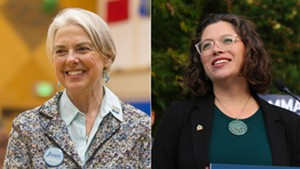

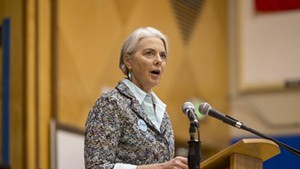
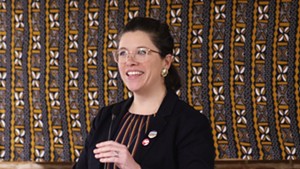









Comments
Comments are closed.
From 2014-2020, Seven Days allowed readers to comment on all stories posted on our website. While we've appreciated the suggestions and insights, right now Seven Days is prioritizing our core mission — producing high-quality, responsible local journalism — over moderating online debates between readers.
To criticize, correct or praise our reporting, please send us a letter to the editor or send us a tip. We’ll check it out and report the results.
Online comments may return when we have better tech tools for managing them. Thanks for reading.